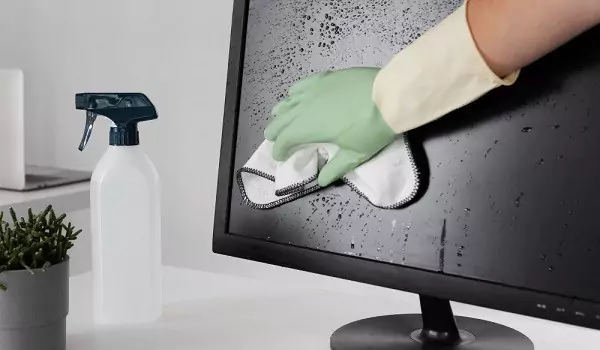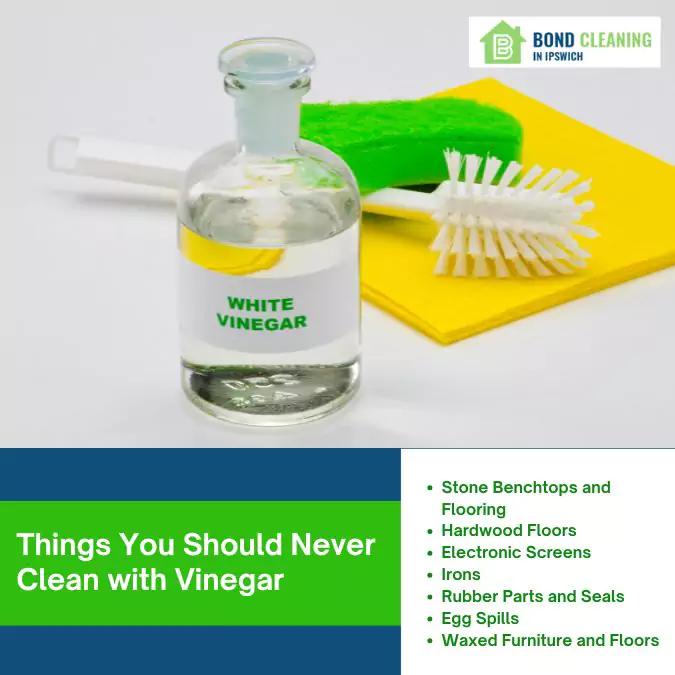
10 Things You Should Never Clean With Vinegar
We all love a good cleaning hack and vinegar is usually the star of the show. Be it removing odours or shining windows, it’s a staple in many Australian Households who want an affordable, non toxic and eco friendly cleaning agent. But before you reach for that bottle again, you might want to hit pause. Vinegar is not a miracle solution that can be used for cleaning anything and everything; in fact, it might end up damaging some of your surfaces.
This article will uncover 10 things you should never clean using vinegar to avoid causing permanent damage or incurring costly repairs. This detail is important to understand if you’re preparing for events like professional Bond Cleaning Ipswich, as these situations demand the property to be left in a “new like” condition. Knowing when not to use vinegar is just as important as knowing when you should, and can save time, effort and money in the long run.
1. Stone Benchtops and Flooring
Natural stones such as granite, marble and limestone are very sensitive towards acidic materials, and therefore application of vinegar over these surfaces could lead to etching, dullness or worse, permanent disfigurement. Although it could be tempting enough to grab your vinegar during the weekend cleaning exercise, it would be wise not to use the same on your stone surfaces. Instead, make use of a pH neutral cleanser that would safely preserve your benchtops and floors from shine loss or damage.
2. Hardwood Floors
While it might seem like a harmless action to mop your hardwood floors using vinegar, the acid in the substance can strip the wood of its protective finish and even dry it out. Over time, this can cause the wood to become brittle and prone to cracking. So, when it comes to cleaning this flooring material, stick to specialised hardwood floor cleaners, especially when aiming for a flawless Bond Cleaning Ipswich inspection result.
3. Electronic Screens

Electronic gadgets like laptops, televisions and smartphones all have delicate screens with special coatings that can get damaged by vinegar’s acidic properties. It can possibly cause clouding, harm the anti-glare properties and reduce the responsiveness of touchscreens, all of which reduce the lifespan of the device. Instead, use a soft cloth that has been slightly dampened by water or a screen specific cleaning solution to safely take care of these delicate surfaces.
4. Irons
It might seem logical to try and clean the inside of your steam iron with the help of vinegar, but in truth, this is a terrible idea. Vinegar and its properties can damage the internal components of the iron and cause them to corrode, leading to leaks in the device or even a broken mechanism. Most manufacturers will advise you to clean the iron using distilled water, so the best practice would be to follow the instructions in the device’s manual.
5. Rubber Parts and Seals
Rubber materials, often found in washing machines, dishwashers and refrigerators, can degrade when exposed to vinegar over time. The acid weakens the rubber, making it brittle and prone to cracking. If you’re planning to deep clean your appliances for your upcoming detailed bond cleaning Ipswich inspection, it’s better to wipe them with a mild detergent solution rather than risk causing hidden damage.
6. Egg Spills
If you accidentally drop your egg on your kitchen surfaces or floor, resist the urge to spray vinegar over it. The acid in the vinegar acts with the chemicals in the egg, causing it to coagulate and making it even more difficult to clean. Instead, try scooping the bulk of the egg using a spatula and use warm, soapy water to clean the rest of the left behind residue.
7. Waxed Furniture and Floors
The acidity in vinegar can strip away the wax coating on furniture and floors, leaving them dull and unprotected. This compromises the surface’s natural shine and makes it more susceptible to damage. To keep your vintage wooden table or polished floors looking their best, always use cleaners that are designed specifically for waxed surfaces.
8. Certain Kitchen Appliances
Kitchen appliances like blenders, coffee makers and food processors often contain metal parts and seals that are not compatible with vinegar. So, with prolonged exposure to the same, corrosion may occur and affect the appliance’s performance and safety. To best clean such kitchen appliances, it’s better to stick to the instructions in the manual to avoid voiding any warranties or causing costly damages.
9. Aluminium Surfaces
If you use vinegar to clean your aluminium pots, pans or fixtures, you will end up causing pitting and discolouration in them. Aluminium has a very strong reaction with acidic substances, leading it to deteriorate upon being exposed to it. In order to clean such surfaces safely, use a mild dish soap and water combination or use products that are specifically designed for cleaning things made of aluminium.
10. Knives
Good quality knives, especially those made from high carbon steel, should never be cleaned with vinegar. The acid can corrode the metal and damage the blade’s edge. To keep your knives sharp and rust free, wash them by hand with warm soapy water and dry them immediately. This practice will help maintain it for longer.
Things You Should Never Clean with Vinegar

Wrapping up
There is no doubt that vinegar is a powerful and highly versatile natural cleaning agent, but it, too, has its limitations. If you don’t know where to use vinegar and where not to use it, you might subject your possessions to unintended damage. So, as a rule of thumb, pay close attention to the materials you’re cleaning and test whether it’s compatible with your particular cleaning agent; this will help you in avoiding large scale damage. Happy Cleaning!

